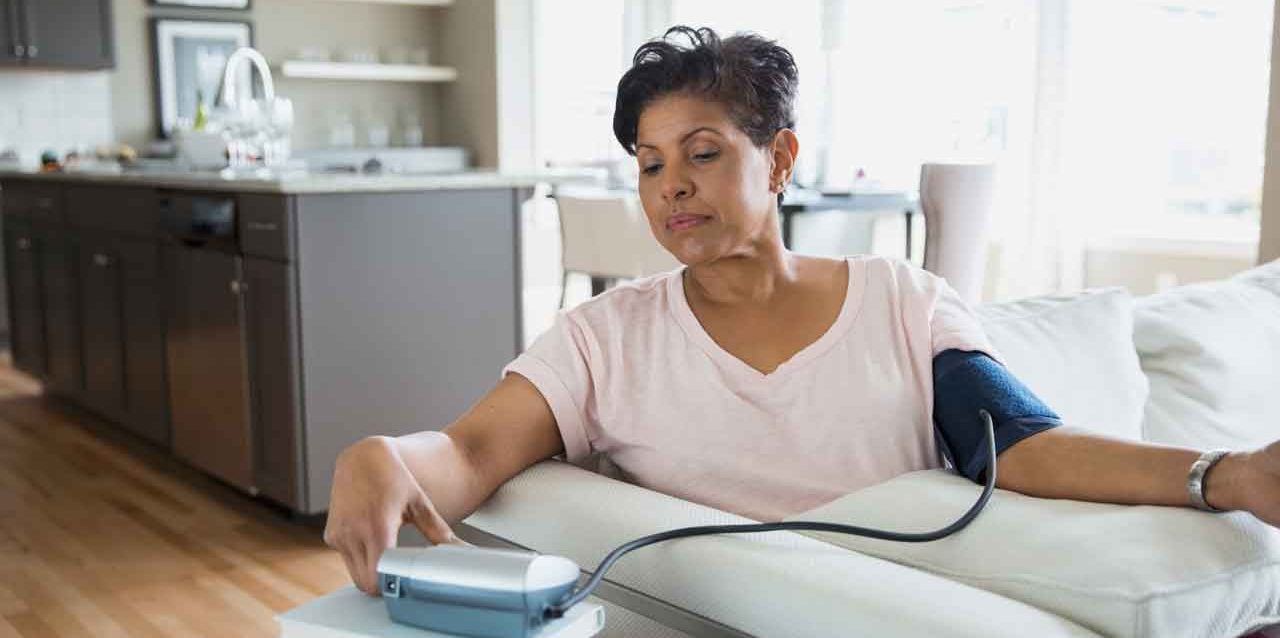High Blood Pressure Symptoms

No list of high blood pressure symptoms will show you you’re in trouble. Instead, keep track of your numbers and follow medical advice on diet and exercise.
Don’t believe the myth that there are clear signs of high blood pressure. Generally, people with hypertension have no symptoms at all.
YOU MIGHT ALSO LIKE: High Blood Pressure Diet
What is hypertension?
Hypertension is another name for high blood pressure, the force that blood puts against the walls of your blood vessels. Blood pressure normally rises and falls throughout the day. The problem is when it stays high for a long time, which means your heart must work harder to pump blood out to your body.
About one in three American adults have high blood pressure, according to the Centers for Disease Control and Prevention, and children can develop it as well.
Ask your doctor at your next visit for your blood pressure numbers, which will look like this: 120/80. The top number is referred to as systolic, and the bottom number is called diastolic.
Any numbers less than 120/80 are normal. If the top number falls between 120 and 129 and the bottom number is less than 80, your blood pressure is considered elevated. You have Stage 1 high blood pressure at 130-139/80-89, and Stage 2 at 140 and above/90 and above.
Hypertension greatly raises the risk of several health problems — including heart failure. If your numbers are high, talk to your doctor about what you can do and take the recommendations seriously.
What causes high blood pressure?
In most cases, the cause isn’t clear. Hypertension tends to run in families and is more common among men and African Americans. After age 65, however, African American women have the highest incidence of high blood pressure. The risk factors include smoking, extra pounds, lack of exercise, a salty diet, drinking too much alcohol, stress, and sleep apnea.
When the cause is clear, it is most likely to be kidney disease. Tumors in the adrenal glands can trigger hypertension, and so can estrogen birth control pills and pregnancy.
Myths about high blood pressure symptoms
There are several symptoms that people mistakenly think are high blood pressure symptoms.
Blood pressure that stays at 180/120 or higher is dangerous, and sometimes comes with a headache or nosebleed. But headaches or nosebleeds by themselves are not signs of hypertension.
The American Heart Association offers this advice, “If your blood pressure is unusually high AND you have headache or nosebleed and are feeling unwell, wait five minutes and retest. If your reading remains at 180/120 mm Hg or higher, call 9-1-1.”
Blood spots in the eyes are more common in people with diabetes or high blood pressure, but neither is considered the cause. An eye doctor may see damage to the optic nerve if you have untreated high blood pressure, but don’t worry about floaters.
Facial flushing can be triggered by the sun, cold, spicy foods, wind, hot drinks, and skin-care products. Stress, heat, alcohol, and exercise raise blood pressure temporarily and can make you flush, but they are not symptoms of high blood pressure.
Dizziness is not caused by high blood pressure, but if it is sudden can be a warning sign of a stroke, which may be related to high blood pressure. Dizziness can be a side effect of blood pressure medications.
How can you avoid high blood pressure?
- Get your blood pressure checked regularly.
- Eat a healthy diet.
- Maintain a healthy weight.
- Be physically active.
- Limit alcohol use.
- Don’t smoke.
- Prevent or treat diabetes.
The dangers of high blood pressure.
Heart attack — Over time, high blood pressure damages arteries, which can get so blocked blood flow to your heart is interrupted.
Stroke — High blood pressure can affect blood vessels in your brain, which may clog or burst.
Heart failure — The extra work caused by high blood pressure can make your heart grow bigger and ultimately fail to circulate blood.
Kidney disease or failure — High blood pressure can damage the arteries around your kidneys, which then fail to filter blood properly.
Vision loss — High blood pressure can damage blood vessels in your eyes.
Sexual problems — In men, high blood pressure can lead to erectile dysfunction. In women, it may lower desire.
Angina —You can get angina, chest pain, if high blood pressure leads to heart disease.
Peripheral artery disease— Narrowed arteries, known as atherosclerosis, can affect the arteries in your legs, arms, stomach, and head.
Updated:
January 10, 2019
Reviewed By:
Janet O’Dell, RN